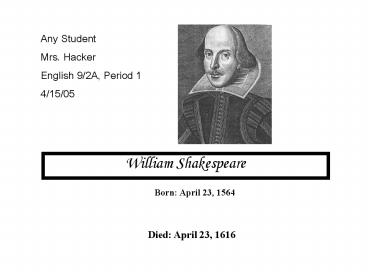William Shakespeare PowerPoint PPT Presentation
1 / 6
Title: William Shakespeare
1
Any Student Mrs. Hacker English 9/2A, Period
1 4/15/05
William Shakespeare
Born April 23, 1564
Died April 23, 1616
2
A Selected Bibliography Poetry Venus and
Adonis (1593) The Rape of Lucrece (1594) The
Sonnets of Shakespeare (1609)
3
- Biography
- Early
- At eighteen, he married Anne Hathaway and raised
two daughters - In 1585 he went to London to begin his
apprenticeship as an actor - Middle
- He was regarded as the foremost dramatist of his
time. - Shakespeare's 154 sonnets were composed between
1593 and 1601 - Shakespeare wrote more than 30 plays divided into
four categories histories, comedies, tragedies,
and romances. - Late
- After 1612, Shakespeare retired from the stage
and returned to his home in Stratford - Shakespeare died on his birthday.
- Most important English author of any age
4
Literary device Personification. Portrays a thing
or abstract quality as a person, for literary
effect. In the sonnets, Shakespeare often
portrays time and death as persons SONNET
107 Not mine own fears, nor the prophetic soul Of
the wide world dreaming on things to come, Can
yet the lease of my true love control, Supposed
as forfeit to a confined doom. The mortal moon
hath her eclipse endured And the sad augurs mock
their own presage lncertainties now crown
themselves assured And peace proclaims olives of
endless age. Now with the drops of this most
balmy time My love looks fresh, and death to me
subscribes, Since, spite of him, rlllive in this
poor rhyme, While he insults o 'er dull and
speechless tribes And thou in this shalt find
thy monument, When tyrants' crests and tombs of
brass are spent. 107 "my love looksfresh, and
death to me subscribes defers, since spite of
him death I'll live in this poor rhyme sonnet
while he death insults o 'er dull and
speechless tribes ie dead people The Effect
The writer triumphs over death personified
because the sonnet lives on and death only
conquers dead people.
5
FAVORITE POEM THAT TIME OF YEAR THOU MAYST IN ME
BEHOLD (Sonnet 73) William Shakespeare That
time of year thou mayst in me behold When yellow
leaves, or none, or few, do hang Upon those
boughs which shake against the cold, Bare ruined
choirs, where late the sweet birds sang. In me
thou see'st the twilight of such day As after
sunset fadeth in the west Which by and by black
night doth take away, Death's second self, that
seals all up in rest. In me thou see'st the
glowing of such fire, That on the ashes of his
youth doth lie, As the deathbed whereon it must
expire, Consumed with that which it was
nourished by. This thou perceiv'st, which makes
thy love more strong, To love that well which
thou must leave ere long I most like the
beautiful language and the careful
structure. These images endure because any reader
in any age can easily relate to the message of
the author.
6
Works Cited Applebee, Arthur N., et al. The
Language of Literature. Evanston, Illinois
McDougal Littell. 2002. -----Slide 1 MLA
heading /picture of author/ name of the author /
date of birth/death. -----Slide 2Bibliography
of titles properly punctuated. -----Slide
3BiographyEight (minimum) bulleted sentences
from early, middle and late part of poets
life. -----Slide 4Literary Device Literary
term defined. / Poem or an excerpt from poem (not
found in literature book) that demonstrates the
literary term/ Sentences explaining how device
used in poem ----Slide 5Second Poem There is
a second poem written by the poet that is not in
the literature book. The reason you liked the
poem is in complete sentences. -----Slide 6Works
Cited copied properly

